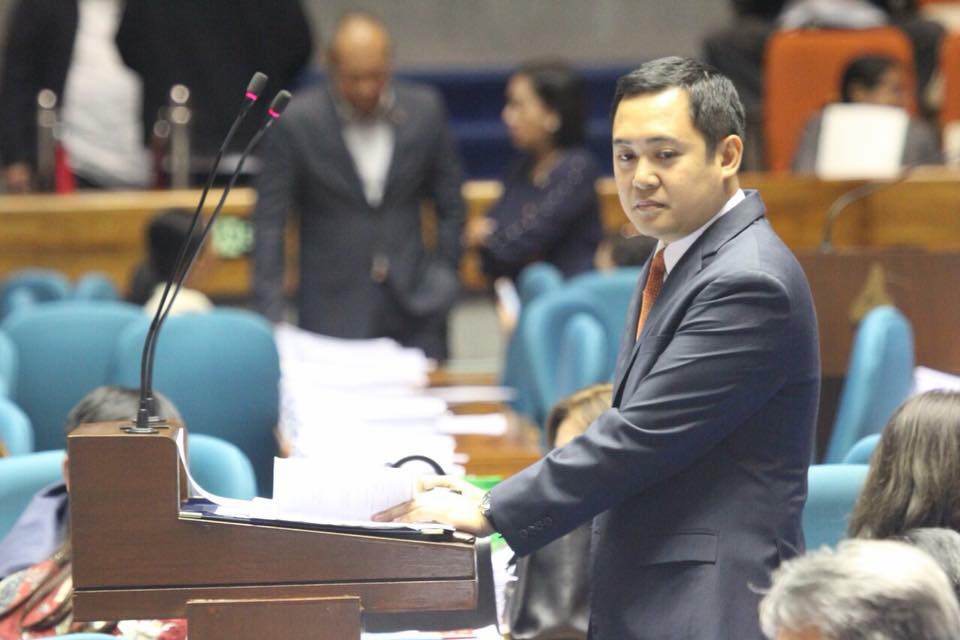
MANILA — Puwersa ng Bayaning Atleta (PBA) party-list Rep. Jericho Nograles on Tuesday said he has refiled his proposed measure, which seeks to eradicate hunger and address the country’s malnutrition problem through social transfer programs, public nutrition supplement, and regular school feeding programs.
House Bill 1532, also known as the Right to Adequate Food Framework Act, or simply the Zero Hunger Bill, was refiled by the lawmaker on Monday.
Nograles and his brother, Cabinet Secretary Karlo Nograles, filed a similar bill during the 17th Congress but only managed to hurdle the approval of the House of Representatives on third and final reading.
In filing HB 1532, Nograles said the updated Zero Hunger Bill seeks not only to harmonize all laws related to Filipinos’ right to adequate food, but would also clarify the scope and content of the right, establish standards for compliance, lay down principles to shape the process of realization, and prohibit violations of the right to adequate food.
“More importantly, the measure seeks to synergize government actions to help farmers cope up with the effects of the lifting of the quantitative restriction on imported rice and increase the country’s food production capacity,” he said.
The proposed measure also allows the poor to access cheap but locally produced food products by requiring government agencies like the Department of Agriculture and the Departments of Social Welfare and Development (DSWD) to directly buy from local farmers and resell directly to the poor communities and urban poor cooperatives.
“This bill will not only help us fight hunger but it would also provide the much-needed lifeline for our farmers who are now reeling from the effects of the liberalized importation of rice. We want to harmonize all programs related to our desire to defeat hunger and increase our food production,” Nograles said.
“In essence, the measure seeks to institutionalize programs to make food a sustained priority and a legal right and not an object of charity,” he added.
If enacted into law, HB 1532 would require the government to institute programs that would ensure that in two and a half years after its effectivity, the incidence of hunger will be reduced by twenty-five percent; further reducing it by another 25 percent after five years; and another 25 percent after seven and a half years.
The State shall also ensure that within 10 years from its effectivity, lands devoted to food production will be increased to 50 percent of all prime agricultural land in every region.
Within the same period, the State shall also ensure that the following indicators will considerably and steadily increase: percentage of development of ancestral lands; percentage of rural population with access to productive resources; share of budget spent on programs aimed at creating access to productive resources; percentage of budget spent on agri-research, agri-extension, irrigation, training, technology, credits and rural development; percentage of rural female-headed households, or rural women, with legal title to agriculture lands; percentage of public budget allocation for social transfer programs to those unable to feed themselves; coverage of marginalized and disadvantaged population taking part in social transfer programs; percentage of marginalized and disadvantaged population covered by a public nutrition supplement program; percentage of population aware of available food and nutrition programs; and coverage of school feeding programs.
Periodic reviews would be undertaken to ensure compliance with set targets, giving priority to areas with a chronically malnourished population.
“The measure’s ultimate goal is to achieve zero hunger even among the poorest of the poor after ten years of its implementation,” Nograles said.
Peasant and fisherfolk groups support Zero Hunger Bill
Meanwhile, the National Food Coalition (NFC), a broad organization of peasants, fisher folks, informal settlers, women, elderly, indigenous peoples and youth, expressed its support for the passage of the bill.
NFC convenor Aurea Miclat-Teves said the organization is appealing to all legislators, as well as President Rodrigo Duterte, to make the proposed measure an urgent bill and be part the 18th Congress’ legacy in helping eradicate hunger and poverty in the country.
“HB 1532 could finally provide the best solution to defeat hunger. It would establish and sustain the right to adequate food for all Filipinos,” she said in a statement.
“Let us join hands and take this opportunity to once again voice out our call for the immediate passage of the bill, most urgently at the House of Representatives. Without adequate and nutritious food, large numbers of Filipinos will remain malnourished – underweight, stunted, wasted – with diminished capacity or energy to think and act for themselves or their country, leading to an impoverished and largely incapacitated nation,” Miclat-Teves said.